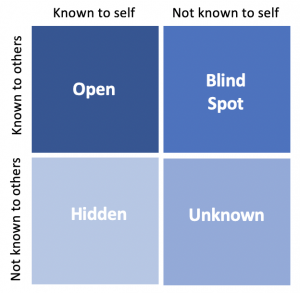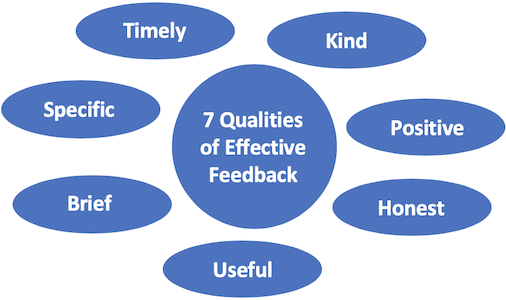3 Giving & Receiving Feedback
Lucinda Atwood
In this chapter you’ll learn how to give useful, skilful feedback that supports and encourages the recipient. You’ll also learn how to accept feedback to help you and your career.
Why is Effective Feedback Important?
Effective feedback helps us improve and grow. Good feedback describes areas for improvement and offers ways to improve.
Shows us what we don’t know about ourselves
Effective feedback often tells us things we don’t know about ourselves. Sometimes it’s physical – like speaking too fast. Or it could be a mistake in our work that we’re not aware of.
Johari Window
The Johari Window describes the four parts of our self-awareness:
- Open: What we know about ourselves, and is also known by others
- Blindspot: What we don’t know about ourselves, but is known by others
- Hidden: What we know about ourselves, but is not known by others.
- Unknown: What we don’t know about ourselves, and is not known by others.1
Effective feedback helps us see our Blind Spots. When we see them we can start to improve.
What Makes Feedback Effective?
–
–Effective feedback has 7 qualities:
- Timely: Soon after the occurrence
- Kind: Help the recipient build skills; don’t embarrass or shame them
- Positive: Tell the recipient what to do, not what not to do
- Honest: Don’t lie to be nice. Tell the truth, kindly
- Useful: “Great job!” is kind but not useful. Give practical, precise feedback
- Brief: Focus on only 1 improvement – the most important one. More will confuse the recipient
- Specific: Be precise and give examples
How to Give Feedback
There are many ways to give feedback. This simple 3-step method is easy to remember and use.
- Keep Start by describing the best part: What did they do well? What should they keep doing?
- Improve Then describe the most important improvement, and why it’s important. Focus on ‘next time’ or ‘in future.’ For example, Next time, try to let us know before the deadline. That way we can help you before it’s a problem.
- Ask the recipient if they have questions, if what you said makes sense
How to Receive Feedback
We often feel ashamed or embarrassed when receiving feedback. Most of us have a really mean inner critic who yells at us for not being perfect. This makes it hard to listen and learn.
Try to silence your inner critic so that you can benefit from the feedback. These strategies will help:
–
Listen actively.
- Make eye contact with the person giving you feedback
- Take notes – you’ll forget what they said
- Summarize what they said
Be respectful & professional.
- Avoid arguing, defending or explaining; try to drop your defences
- Watch your tone, words and body language
- Look for what’s true and what’s useful
Ask questions to clarify doubts and get precise details and examples.
For example:
- Can you say more about…?
- Can you explain that further, please?
- What advice can you give me?
- How can I build that skill?
- Where could I learn more about…?
- What do you recommend?
Appreciate the feedback.
- See the speaker’s good intentions
- Thank the speaker and show appreciation for their time and energy
- Look for what’s useful in the feedback and how it can help you
Reflect & grow.
- Reflect on the feedback and decide your next steps:
- What did you learn?
- How will you use the feedback to improve your skills?
- What will you do next time?
Self-Assessment
Canadian Workplace Quiz
- Joseph Luft and Harry Ingham, “The johari window,” Human relations training news 5, no. 1 (1961): 6-7, http://www.richerexperiences.com/wp-content/uploads/2014/02/Johari-Window.pdf





